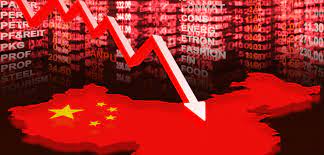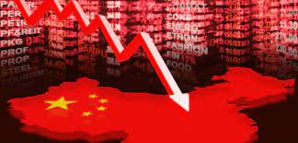China has released poor economic data for April, highlighting the country's enormous damage caused by Covid lockdowns. Retail sales and industry production in the world's second largest economy fell dramatically short of market estimates.
According to China's National Bureau of Statistics, retail sales fell 11.1 per cent in April from the previous year. That was considerably below the 6.1 per cent reduction predicted by economists in a Reuters poll, as well as the 3.5 per cent drop seen in March.
On May 10, 2022 in Beijing, China, a man walks his dog across the almost empty courtyard of the typically crowded Taikoo Li mall in Sanlitun after many retail outlets were shuttered to help prevent the spread of COVID-19.
Last month, industrial production dipped 2.9 per cent from a year ago, reversing a 5 per cent increase in March.
This is the sharpest drop in industrial output since February 2020, when China's economy came to a halt due to the original coronavirus outbreak.
Unemployment also reached its second-highest point in history.
In April, the urban unemployment rate rose to 6.1 per cent, up from 5.8 per cent in March, which was already a 21-month high. Only in February 2020 was China's unemployment rate greater.
According to the data, young people have had a particularly difficult time finding work, with the jobless rate for those aged 16 to 24 jumping to 18.2 per cent, the highest level ever.
Given the possibility of social and political instability, rising unemployment is a red flag for the ruling Communist Party.
"After all, zero-Covid at the cost of surging unemployment is a hard sell politically," said Larry Hu, chief China economist for Macquarie Capital.
The administration anticipates a recovery in the economy this month.
"Economic performance" in May will improve, said NBS spokesperson Fu Linghui on Monday. "As the outbreaks are under control and people's life return to normal, pent-up consumption will be gradually released," he said.
He also said that increased infrastructure investment will aid the recovery.
China's economy got off to a strong start in 2022, with a first-quarter growth rate of 4.8 per cent.
However, Beijing's measures to contain the country's worst Covid epidemic in two years have slowed activity significantly since March, and economists estimate GDP to contract this quarter.
According to latest figures, at least 31 communities across the country are still under complete or partial lockdown. For more than six weeks, Shanghai, the country's financial centre and manufacturing heartland, has been under siege. Many businesses, including manufacturers Tesla and Volkswagen and iPhone assembler Pegatron, have been forced to shut down during this time.
"We think Q2 GDP growth will likely turn negative," said Zhiwei Zhang, president and chief economist for Pinpoint Asset Management, on Monday. "The government faces mounting pressure to launch new stimulus to stabilize the economy," Zhang said.
China's government is aware of the country's economic difficulties and has recently taken moves to alleviate them. The People's Bank of China stated on Sunday that it would lower mortgage rates for first-time homebuyers in an effort to boost the country's struggling housing market.
Separately, the Shanghai administration announced that starting Monday, the city will progressively open stores, restaurants, and salons, providing relief to the city's 25 million citizens. The government has also lately vowed to promote small firms by increasing infrastructure spending and targeting monetary easing.
Manufacturing investments grew 12.2 per cent year over year, according to Monday's report. Meanwhile, infrastructure investment increased by 6.5 per cent.
But "the risks to the outlook are tilted to the downside, as the effectiveness of policy stimulus will largely depend on the scale of future Covid outbreaks and lockdowns," said Tommy Wu, lead China economist for Oxford Economics, on Monday.
"We forecast GDP to grow 4% this year, with a quarterly contraction in the second quarter before returning to growth in the second half."
(Source:www.cnn.com
According to China's National Bureau of Statistics, retail sales fell 11.1 per cent in April from the previous year. That was considerably below the 6.1 per cent reduction predicted by economists in a Reuters poll, as well as the 3.5 per cent drop seen in March.
On May 10, 2022 in Beijing, China, a man walks his dog across the almost empty courtyard of the typically crowded Taikoo Li mall in Sanlitun after many retail outlets were shuttered to help prevent the spread of COVID-19.
Last month, industrial production dipped 2.9 per cent from a year ago, reversing a 5 per cent increase in March.
This is the sharpest drop in industrial output since February 2020, when China's economy came to a halt due to the original coronavirus outbreak.
Unemployment also reached its second-highest point in history.
In April, the urban unemployment rate rose to 6.1 per cent, up from 5.8 per cent in March, which was already a 21-month high. Only in February 2020 was China's unemployment rate greater.
According to the data, young people have had a particularly difficult time finding work, with the jobless rate for those aged 16 to 24 jumping to 18.2 per cent, the highest level ever.
Given the possibility of social and political instability, rising unemployment is a red flag for the ruling Communist Party.
"After all, zero-Covid at the cost of surging unemployment is a hard sell politically," said Larry Hu, chief China economist for Macquarie Capital.
The administration anticipates a recovery in the economy this month.
"Economic performance" in May will improve, said NBS spokesperson Fu Linghui on Monday. "As the outbreaks are under control and people's life return to normal, pent-up consumption will be gradually released," he said.
He also said that increased infrastructure investment will aid the recovery.
China's economy got off to a strong start in 2022, with a first-quarter growth rate of 4.8 per cent.
However, Beijing's measures to contain the country's worst Covid epidemic in two years have slowed activity significantly since March, and economists estimate GDP to contract this quarter.
According to latest figures, at least 31 communities across the country are still under complete or partial lockdown. For more than six weeks, Shanghai, the country's financial centre and manufacturing heartland, has been under siege. Many businesses, including manufacturers Tesla and Volkswagen and iPhone assembler Pegatron, have been forced to shut down during this time.
"We think Q2 GDP growth will likely turn negative," said Zhiwei Zhang, president and chief economist for Pinpoint Asset Management, on Monday. "The government faces mounting pressure to launch new stimulus to stabilize the economy," Zhang said.
China's government is aware of the country's economic difficulties and has recently taken moves to alleviate them. The People's Bank of China stated on Sunday that it would lower mortgage rates for first-time homebuyers in an effort to boost the country's struggling housing market.
Separately, the Shanghai administration announced that starting Monday, the city will progressively open stores, restaurants, and salons, providing relief to the city's 25 million citizens. The government has also lately vowed to promote small firms by increasing infrastructure spending and targeting monetary easing.
Manufacturing investments grew 12.2 per cent year over year, according to Monday's report. Meanwhile, infrastructure investment increased by 6.5 per cent.
But "the risks to the outlook are tilted to the downside, as the effectiveness of policy stimulus will largely depend on the scale of future Covid outbreaks and lockdowns," said Tommy Wu, lead China economist for Oxford Economics, on Monday.
"We forecast GDP to grow 4% this year, with a quarterly contraction in the second quarter before returning to growth in the second half."
(Source:www.cnn.com






